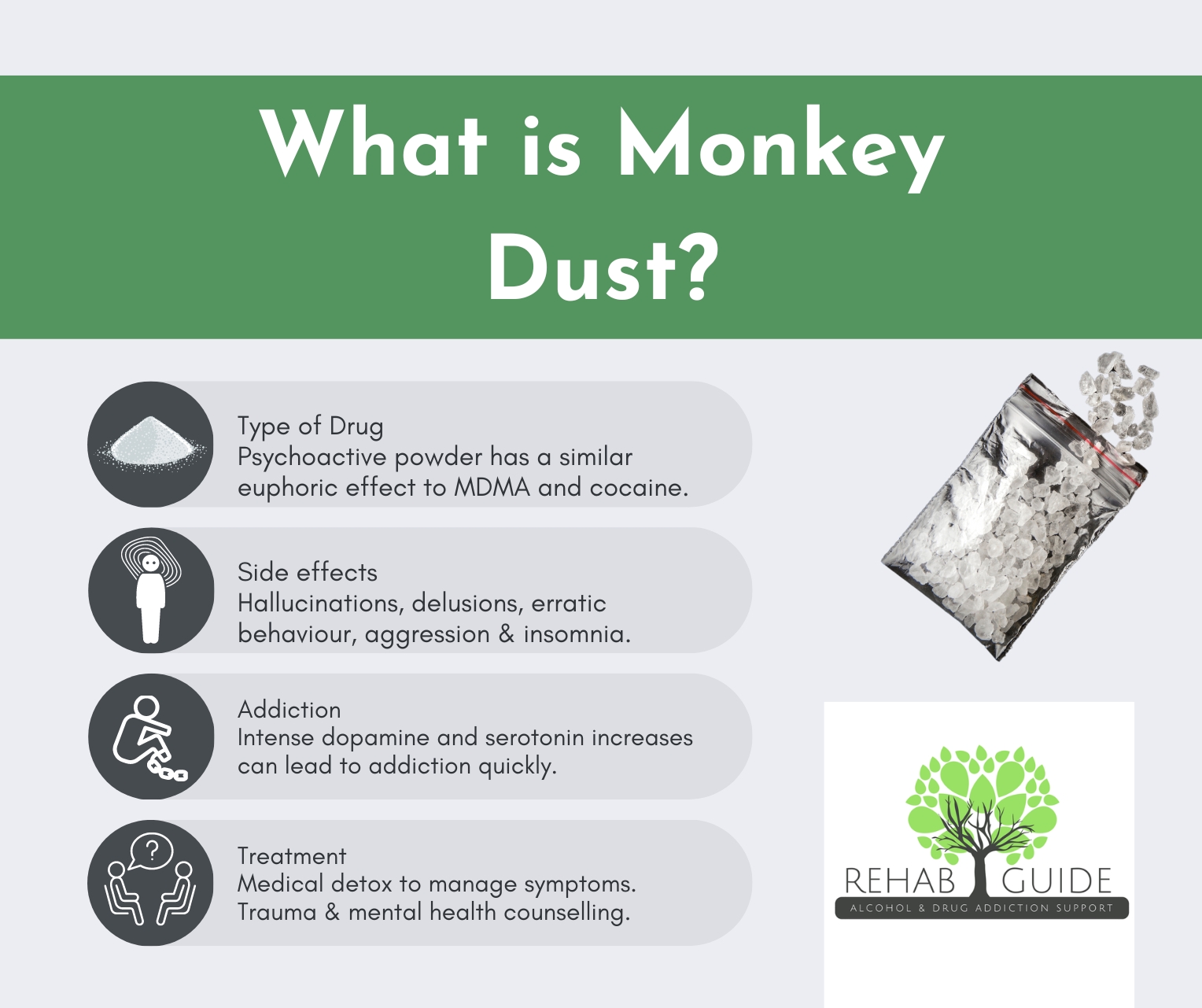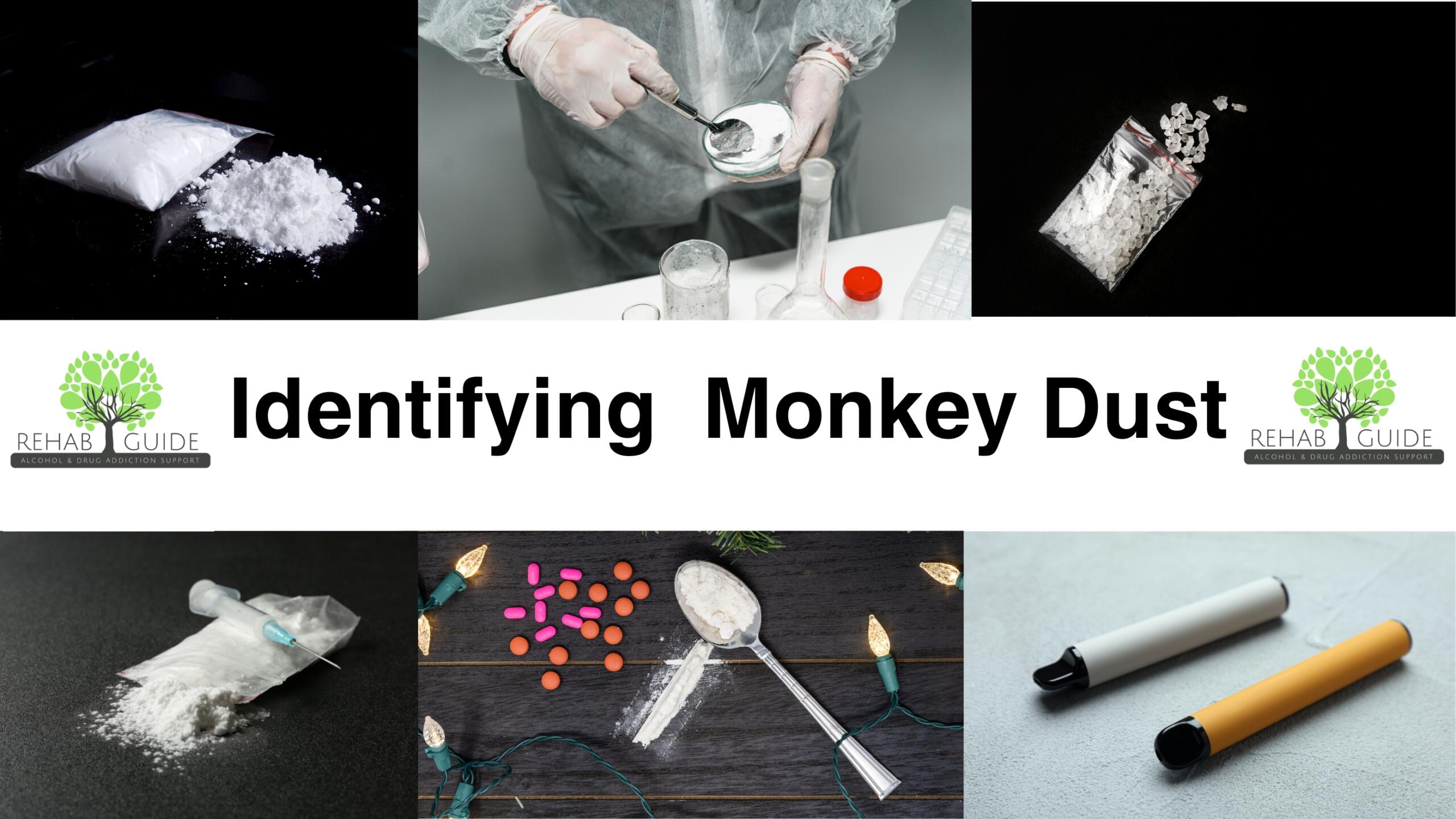0207 205 2845 0207 205 2845



Mental illness, involuntary physical spasms, hallucinations and extreme aggression are just some of the effects of Monkey Dust, a recently developed substance associated with various criminal activities and health issues.
Monkey Dust is currently classed as a Class B drug in the UK, but due to reports of users’ extreme behaviour, there are calls to change its classification. An independent government review is currently ongoing into the choice to change it to a Class A in the UK. Cases of people using the drug jumping off buildings and eating glasses have motivated this review, but what is Monkey Dust, and why does it have such extreme effects on people who take it?
Monkey dust is a manmade drug made in a laboratory by altering the molecules of a plant based chemical cathinone. These are part of a plant called Khat which is the source of several similar stimulant drugs.
Although nicknamed Monkey Dust, this drug is known by various names, such as Butylone M1, Magic Crystals, MDPV, Methylone, or Pyrovalerone, which typically comes in the form of a white, off-white, yellowish, or brown powder.
It is inexpensive to purchase, but quality and exact contents are unpredictable and can be purchased for as little as £2, making it accessible to people who are vulnerable and on a lower income.
Initially, cathinones were marketed online as a “legal” alternative to drugs like speed, ecstasy, and cocaine.
To evade legal issues, sellers labelled these cathinones as unsuitable for human consumption and instead sold them as plant food or bath salts.
Eventually, the government managed to oversee these loopholes used by sellers and prohibited the substance altogether.
Monkey dust is a psychoactive drug that is commonly consumed by snorting it through the nose.
However, it is also available in other forms, such as capsules and pills, allowing users to ingest it orally.
Additionally, some users may smoke monkey dust, while others may inject it, although this method is relatively uncommon.
Consuming Monkey Dust carries several potential risks and adverse effects.
Those who consume the drug on occasion may experience an accelerated heart rate, elevated blood pressure, and irregular heartbeat. These physiological changes can pose significant health risks, particularly for those with pre-existing cardiovascular conditions.
If, on the other hand, Monkey Dust is being used excessively, in other words, abused, it may lead to severe dehydration and hyperthermia, increasing the risk of organ failure and even death.
Mental health consequences are another concern associated with monkey dust usage.
Prolonged and frequent consumption of the drug has been linked to anxiety, paranoia, and hallucinations.
Users may also experience agitation, aggression, and even severe psychosis; these psychological effects can harm the user’s overall well-being and may require professional intervention and treatment.
The impact of Monkey Dust is strong and can last as long as 12 hours. However, this extended period of being under the influence can lead from feelings of euphoria to feelings of extreme fear, irrational actions, and a significant rise in both aggression and violent behaviour. A drug test will show mephedrone in your system for 48 to 72 hours or longer if you take a very large amount or are a frequent long-term user.
An addiction to Monkey Dust occurs when those who use it find it difficult to quit despite the potentially dangerous and negative effects it can have on their life. Monkey dust addiction can develop in the following ways:
Those who are already grappling with substance misuse or mental health issues may feel that Monkey Dust offers them a reprieve from having to deal with the challenges of their day-to-day lives; this is because Monkey Dust can provide users with an overwhelming feeling of bliss, which they might struggle to obtain through alternative methods.
However, any feelings derived from taking Monkey Dust are fleeting and will likely intensify the root problems of the user, leading to an unending and dangerous cycle of Monkey Dust misuse.
Another example of how Monkey Dust can take hold is through recreational use.
Individuals who engage in recreational drug use can quickly develop a dependency on Monkey Dust due to its enjoyable effects, making it difficult for them to stop.
Recreational use can rapidly escalate as users build a tolerance to the substance, making it necessary for them to take higher doses to attain the same desired effect. Which, eventually, will result in addiction.
When the user becomes addicted and is, for some reason, unable to consume Monkey Dust for a period of time, then they may experience withdrawal symptoms such as sleeplessness, queasiness, unease, and distrust of others.
Apart from drug abuse and mental health problems, several other factors can increase the chances of Monkey Dust addiction, which include:
Monkey Dust may offer temporary relief from distressing thoughts and emotions, but the underlying issues remain.
It is a relatively new and cheap drug; therefore, it can still be easily obtained on the streets. For example, Stoke on Trent has experienced severe effects of Monkey Dust addiction due to the drug being so accessible there.
Individuals who are socially isolated and lack meaningful connections are more prone to resort to substances like Monkey Dust.
There is a belief that genetic predisposition plays a role in drug addiction, so if you have family members struggling with substance abuse, your likelihood of developing a Monkey Dust addiction is increased.
Many drugs are taken together with alcohol. It is a common substance and frequently available, although the combination of alcohol and a drug will vary. Taking Monkey Dust and even small amounts of alcohol increases the psychoactive effect and euphoria of the drug. This combination not only increases the dopamine reward and, therefore, the likelihood of being addicted to Monkey Dust but also increases the risks to your heart by worsening the cardiovascular side effects.
Due to the severe impact of the Monkey Dust, it is vital to recognise and address any signs of addiction by getting help and support from medical professionals as soon as possible.
Here are some signs that may indicate Monkey Dust addiction:
If any of these sound like something you can relate to, then you may have an addiction to Monkey Dust, and it is therefore recommended you seek support.

Apart from the typical indications of drug misuse and addiction, such as changes in behaviour and the presence of drugs at home, a frequently mentioned symptom of monkey dust abuse and addiction is the individual omitting odour that resembles the smell of vinegar or prawns.
If you have noticed these signs, then it is likely they have an addiction to Monkey Dust addiction, and it is, therefore, advisable to openly discuss your worries with your loved one and support them in accessing the necessary treatment.
Reading information on the effects of Monkey Dust and other substances is crucial to make you aware of these risks and seek help if someone you know is struggling with monkey dust addiction.
There are two main stages of support required in not just recovering from addiction to Monkey Dust but sustaining that recovery, which are:
First Stage – In the initial phase of recovery, the main objective is to rid your body of monkey dust by undergoing a drug detoxification process, which aims to address the physical aspects of addiction. Due to the potential severity of withdrawal symptoms, it is strongly recommended to undergo this process under the careful guidance of medical professionals for optimal safety and effectiveness.
Second stage – During the second phase of rehabilitation, you will undergo various therapies and activities that will assist you in recognising, confronting, and effectively dealing with the root causes that may have contributed to your dependence on monkey dust.
These stages of rehabilitation have proved to be effective in helping those addicted to substances move on with their lives and allowing them the physiological well-being needed to find a life worth living.
If you are facing difficulties due to your dependence on monkey dust, you must seek treatment as soon as possible.
Our dedicated team at Rehab Guide can be contacted by phone, email or online chat any time of day so we can guide you in locating the most suitable rehabilitation facilities in the UK, initiate your path towards recovery, and liberate yourself from the clutches of this dreadful substance.
Call us now in confidence at 02072052845 to begin your treatment.